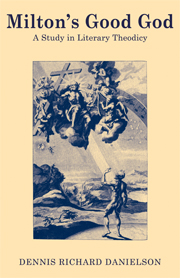Book contents
- Frontmatter
- Contents
- Preface
- 1 The contexts of Milton's theodicy
- 2 God and Chaos
- 3 Assertion and justification: providence and theodicy
- 4 Milton and the Free Will Defense
- 5 Theodicy, free will, and determinism
- 6 Eden and the “soul-making” theodicy
- 7 Paradise Lost and the Unfortunate Fall
- Epilogue
- Appendix: The unfortunate fall of Satan
- Notes
- Selected bibliography
- Index
- Frontmatter
- Contents
- Preface
- 1 The contexts of Milton's theodicy
- 2 God and Chaos
- 3 Assertion and justification: providence and theodicy
- 4 Milton and the Free Will Defense
- 5 Theodicy, free will, and determinism
- 6 Eden and the “soul-making” theodicy
- 7 Paradise Lost and the Unfortunate Fall
- Epilogue
- Appendix: The unfortunate fall of Satan
- Notes
- Selected bibliography
- Index
Summary
Does Milton worship, and present, a good God? Is his epic, Paradise Lost, any good? These two questions must be connected, given the fact that in Paradise Lost Milton openly sets out to justify the ways of God. If Milton presents a God who is wicked, or untruthful, or manipulative, or feeble, or unwise, then his epic poem must suffer accordingly. But if that poem recognizes the case that is brought against the Christian God and counters it (even if not conclusively) with a high degree of philosophical and literary credibility, then the poem and the poet must be praised accordingly. There have been enough critics who have affirmed that Milton and his epic are indeed undermined by the case against God. The purpose of this book is to argue systematically the second, contrary hypothesis, that Milton's theology informs and enhances his literary achievement, and that in fact his justification of God is all the more impressive for its being literary.
My study of Milton and of the problem of evil has its roots in concerns and interests I have had for what now seems a long time, and I take great pleasure in recording here my thanks to a number of people without whose spirit, wisdom, and encouragement my project could not have been the adventure it has been.
- Type
- Chapter
- Information
- Milton's Good GodA Study in Literary Theodicy, pp. ix - xiiPublisher: Cambridge University PressPrint publication year: 1982

